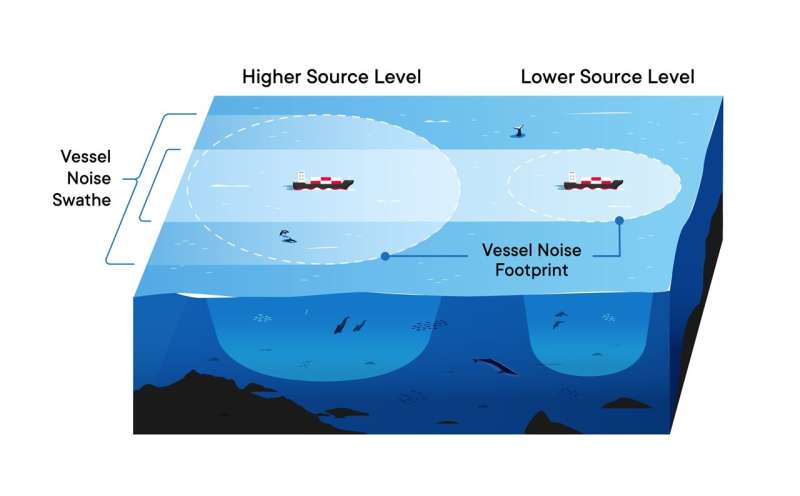June 27, 2023 report
This article has been reviewed according to Science X's editorial process and policies. Editors have highlighted the following attributes while ensuring the content's credibility:
fact-checked
peer-reviewed publication
trusted source
proofread
Slowing down ships in vulnerable areas could reduce negative impact on marine life

A small team of zoologists, eco-scientists and biologists at Aarhus University, in Denmark, reports that slowing down cargo ships when they move through vulnerable areas could reduce their negative impact on marine life.
In their study, published in the journal Science Advances, the group used simulations to show the decrease in negative impact on marine life when ships slow down. Douglas McCauley, with the University of California's Marine Science Institute, published a Focus piece in the same journal issue, outlining the work done by the team on this new effort.
Prior research has shown that ships traversing the oceans have a major negative impact on marine life. In addition to the pollution they leave behind, ships also produce a lot of noise from their propellers, hulls and engines. Ship noise can interfere with communication between sea creatures, their foraging, their migration patterns and also their reproduction activities. Ship noise has been found to have a particularly negative impact on whales. In this new effort, the research team has shown that slowing down ships reduces noise, which in turn reduces negative impacts on marine life.
To learn more about how much slowing down ships might reduce negative marine impacts, the researchers ran numerical-model-based simulations that demonstrated the amount of noise generated by cargo ships as they traveled at three speeds over distances ranging from 300 to 3,000 meters. They used data from prior research efforts to compare the amount of noise generated with impacts on surrounding marine life.
They found that even small reductions in speed could have a positive impact on marine life. And moderate reductions could have a meaningful and immediate impact. They also found that modifying ship routes could reduce negative impacts. Slowing cargo ships would also reduce the number of collisions with whales. Additionally, it would also reduce fuel consumption and therefore costs. McCauley notes that slowing ships could be done strategically to reduce marine impacts while minimally impacting ship travel time between destinations.
More information: Charlotte R. Findlay et al, Small reductions in cargo vessel speed substantially reduce noise impacts to marine mammals, Science Advances (2023). DOI: 10.1126/sciadv.adf2987
Douglas J. McCauley, The future of whales in our Anthropocene ocean, Science Advances (2023). DOI: 10.1126/sciadv.adi7604
Journal information: Science Advances
© 2023 Science X Network




















